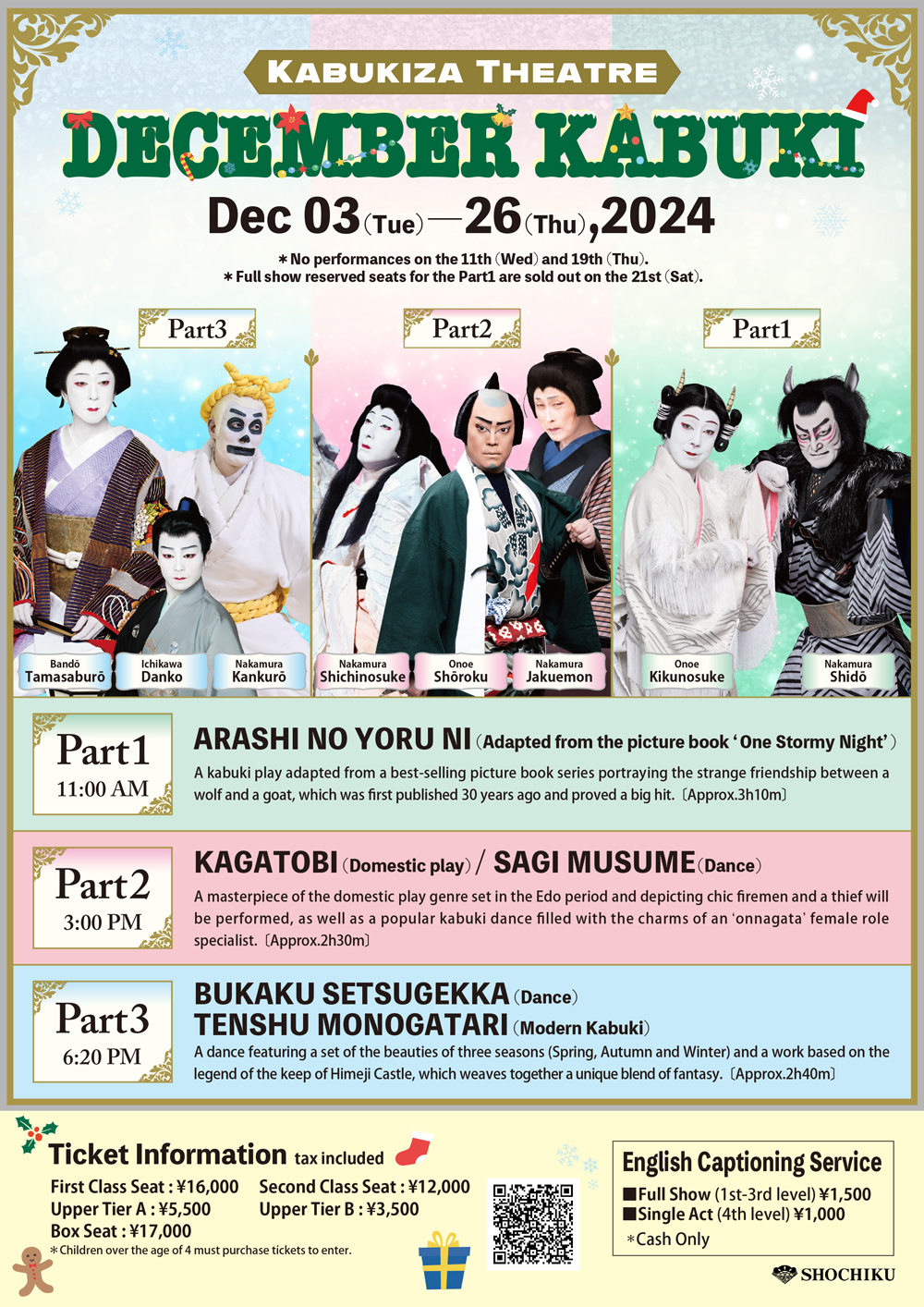Kabukiza Theatre
December Program at the Kabukiza Theatre
Daily: Dec 03 (Tue) - Dec 26 (Thu), 2024
Part 1: 11:00 AM
Part 2: 3:00 PM
Part 3: 6:20 PM
*No performances on the 11th (Wed) and 19th (Thu).
*Reserved seats for Part 1 are sold out on the 21st (Sat). (Single Act Seats will still be available.)
On sale: from Nov 14 (Thu), 2024 10:00 AM(JST)
Ticket Price
First Class Seat: 16,000
Second Class Seat: 12,000
Upper Tier A: 5,500
Upper Tier B: 3,500
Unit: Japanese Yen (tax included)
Ticket with "English Captioning Service"
Tickets that include an English captioning device are available on the website. Please select "Ticket with English Captioning Service" (1,500 yen will be added to the ticket price) on the ticket purchase page.
*Box Seat: 17,000 (Not available online. Click here for details.)
*Children over the age of 4 must purchase tickets to enter.
*Tea will not be offered at the Box Seats.
Kabukiza Theatre (at TOKYO) Theatre Information
- Single Act Tickets
- *Tickets for dates shown as "Sold Out" or for other preferred seating areas, may still be available from the promoter, Shochiku Co., Ltd. Please confirm the availability by phone or stop by the Box Office.
*English captioning service available to rent. Click here for details.
*Sold program (Detailed English synopsis are found at the end of the Japanese program) available.
In Part 1, you will see a kabuki play adapted from a best-selling picture book series portraying the strange friendship between a wolf and a goat, which was first published 30 years ago and proved a big hit. In Part 2, a masterpiece of the domestic play genre set in the Edo period and depicting chic firemen and a thief will be performed, as well as a popular kabuki dance filled with the charms of an ‘onnagata’ female role specialist. In Part 3, please enjoy a prestigious dance whose title contains the haiku poetry penname of Nakamura Kanzaburō XVII, and a masterpiece by Izumi Kyōka based on the legend of the keep of Himeji Castle.
 Kabukiza Theatre Stage Photo
Kabukiza Theatre Stage Photo
(Intermission: 35 minutes)
1:05 PM - 2:07 PM
ARASHI NO YORU NI
['One Stormy Night']
CAST :
- Gabu
- Nakamura Shidō
- Mei
- Onoe Kikunosuke
- Tapu
- Bandō Kamezō
- Princess Mii
- Nakamura Yonekichi
- Haku
- Ichimura Takematsu
- Noro
- Ichimura Hikaru
- Mei in childhood
- Nakamura Haruki
- Gabu in childhood
- Nakamura Natsuki
- Barry
- Sawamura Kiyoshirō II, changing his name from Sawamura Kuniya
- Ojiji, Old Male Goat
- Ichimura Kitsutarō
- A painter
- Ichikawa Monnosuke
- Gai
- Kawarasaki Gonjūrō
- Obaba, Old Female Wolf
- Ichimura Manjirō
- Giro
- Onoe Shōroku
STORY :
On the night of a storm, Gabu, a wolf, and Mei, a goat, happen to meet in a mountain hut under the cover of darkness. Unable to see what each other looks like or to tell who they are, they talk throughout the night and become friends. Before parting, they decide to use "one stormy night" as a secret code and promise to meet the next day. When they are reunited, they are shocked to find out each other's identity, for wolves are goats' natural enemy, but they cultivate their friendship keeping it a secret to both of their groups. However, soon their friendship is revealed and they face violent opposition. To protect their friendship, they run away into the snow-covered mountains and...
KAGATOBI
['The Firemen of Kaga']
CAST :
- Tenjinchō Umekichi / Takegaki Dōgen, a masseur
- Onoe Shōroku
- Hikagechō Matsuzō
- Nakamura Kankurō
- Harukichō Minosuke
- Nakamura Shidō
- Sakigake Yūji
- Bandō Hikosaburō
- Banjaku Ishimatsu
- Bandō Kamezō
- Toraya Takegorō
- Nakamura Tanenosuke
- Tengu no Sugimatsu
- Nakamura Tamatarō
- Hirukko Onokichi
- Onoe Sakon
- Oasa
- Nakamura Tsurumatsu
- Tsumakoi Otokichi
- Onoe Kikushirō
- Kanesukechō Kanegorō
- Onoe Kikuichirō
- Juzudama Fusakichi
- Sawamura Kiyoshirō II, changing his name from Sawamura Kuniya
- Goshuden Monji
- Nakamura Kichinojō
- Kaminari Gorōji
- Ichikawa Omezō
- Omikoshi Yatarō
- Nakamura Matsue
- Iseya Yohē
- Kawarasaki Gonjūrō
- Okane, a masseuse
- Nakamura Jakuemon
STORY :
This is a 'sewamono' play, a work portraying in a realistic way the lives of ordinary people in the Edo Period. A big fight has broken out over a trivial matter between the firemen of Kaga Domain and the fire fighters under the direct control of the Edo shogunate. All the firemen of Kaga including Matsuzō of Hikagechō gather at the town gate of Hongō to beat the fire fighters of the Edo shogunate, but Umekichi of Tenjinchō persuades his impetuous colleagues to withdraw. A masseur Takegaki Dōgen kills the farmer Tajiemon at the embankment of Ochanomizu and steals the money he possessed. Matsuzō, who has happened to pass by, picks up a tobacco pouch which Dōgen dropped. Dōgen hears that his niece Oasa received money from the Iseya pawn shop where she is an apprentice, and thinks of extortion. He visits Iseya with his lover Okane, a masseuse, and tries to extort 100 gold coins. But Matsuzō shows the tobacco pouch to Dōgen and they scuttle off. Finally, his evil deeds are discovered and pursuers are sent after him. In the end he is arrested before the front gate of the mansion of the Kaga Domain. Enjoy the speeches in seven-five syllabic meter which is typical of the playwright Kawatake Mokuami, as well as how a single actor plays both Umekichi and Dōgen.
Intermission: 20 minutes
SAGI MUSUME
['The Heron Maiden']
CAST :
- The spirit of a heron
- Nakamura Shichinosuke
STORY :
A woman dressed in a white kimono and hood appears at the edge of a lake. Her dance includes bird-like movements resembling those of a white heron. She expresses the misery of one whose love was betrayed. A sudden onstage costume change begins a section in which the character transforms into a young girl preoccupied by thoughts of romance. Other costume changes follow, as the maiden expresses the difficulty of capturing a loved one's heart. Finally, the stage darkens and after another spectacular costume change, the maiden transforms into the spirit of a heron as she recalls her suffering in hell.
BUKAKU SETSUGEKKA
['Three Dances on Snow, the Moon and Cherry Blossoms']
CAST :
- The spirit of a cherry blossom / A matsumushi insect /
Snowman - Nakamura Kankurō
- A matsumushi insect
- Nakamura Chōzaburō
STORY :
It is common to group beautiful things in sets in Japan, and this dance features a set of the beauties of three seasons. The first dance evokes the cherry blossoms of spring, the second describes the songs of 'matsumushi' insects under the moon in autumn, and the third dance evokes a snowman or 'yuki daruma' to complete the set with a scene of winter.
Intermission: 30 minutes
TENSHU MONOGATARI
['The Tale of a Castle Keep']
CAST :
- Princess Tomi, mistress of the keep
- Bandō Tamasaburō
- Himekawa Zushonosuke
- Ichikawa Danko
- Princess Kame
- Nakamura Shichinosuke
- Odawara Shuri
- Nakamura Kashō
- Nadeshiko, a maid
- Nakamura Kamenojō
- Susuki, chief lady-in-waiting
- Kamimura Kichiya
- Red Priest
- Ichikawa Omezō
- Long-Tongued Hag
- Ichikawa Monnosuke
- Ōminojō Tōroku, a woodcarver
- Nakamura Shidō
STORY :
The top of Shirasagi Castle in Harima Province is another world inhabited by beautiful and mysterious spirits who keep humans at bay. Their mistress is the beautiful and noble Princess Tomi. Her friend, Princess Kame, who adores her as her sister visits her. Princess Tomi rejoices at their reunion and gives Princess Kame a present: the white falcon which is the prize possession of Takeda, Lord of Harima. That night, Himekawa Zushonosuke, who serves the Lord of Harima as his falconer, comes to the keep in search of the falcon. Impressed by his gallant mien, Princess Tomi gives him the treasured helmet of the castle lord and allows him to return safely. When Zushonosuke descends from the keep and returns to his compatriots, he is suspected of stealing the treasured helmet… This work which weaves together a unique blend of fantasy, is one of the foremost masterpieces of Izumi Kyōka. Please look forward to experiencing the amazing world of beautiful, mysterious spirits who live apart from the human realm.


